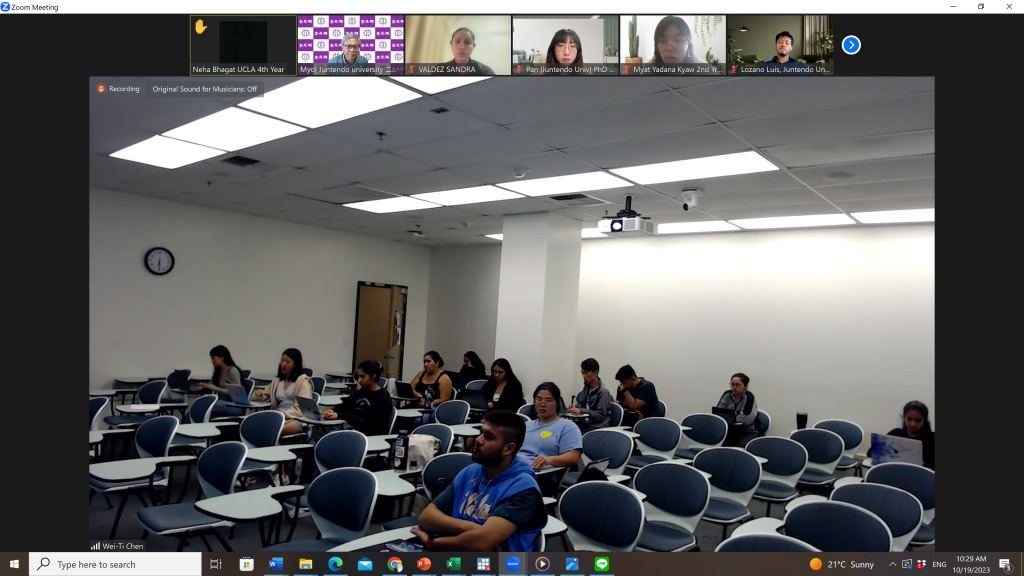Healthy Ageing Lecture for UCLA School of Nursing, Global Health Class
Principal Investigator of Digitally Inclusive Healthy Ageing Communities (DIHAC): a cross-cultural study in Japan, ROK, Singapore and Thailand, Assoicate Professor Myo Nyein Aung, Department of Global Health Research, Juntendo University, was invited to give a lecture for The University of California, Los Angeles (UCLA) School of Nursing, Global Health Class on 19th October 2023 in Zoom. The lecture is entitled as Community-Based Social Innovations (CBSI) for healthy ageing in Japan. The lecture was attended by 19 undergraduate students and 3 graduate students from UCLA and PhD students from Juntendo University. Professor Wei-Ti Chen UCLA hosted the lecture as moderator.
The lecture started by discussing two global mega-trends: population ageing and digitization around the world and addressed global orientation of four action areas in the healthy ageing decade such as age-friendly environment, social inclusion, long term care and integrated care. After introducing population ageing in Japan and community-based integrated care system, the lecturer explained the details of age-friendly environment. In particular, the delivery models and impacts of healthy ageing activities were explained. He classified CBSIs based on targeted action of the activities such as CBSI-1 for physical fitness for prevention of frailty, and CBSI-2 for social and cultural activities for active ageing based on the article published in the Gerontologist in 2022. (1,2) The lecture explained how health promotion for the older adults was being sustained, during the pandemic from 2020 to 2022, by a community integrated model in a city in Tokyo. The digital gap among the older persons became a significant barrier for the health promotion. This prompted triggered the DIHAC researchers to study how to empower older persons to be able to use internet and digital technology in different countries and starting to compare cross-cultural experiences in Asia.
The latter part of the lecture addressed digital inclusion of the older persons and its importance as super social determinant of the health. In addition, the lecture introduced selected examples of contemporary excellent practices of digital inclusion empowerment programs in Japan and Singapore. (3,4)

Figure: Health Ageing Lecture at UCLA School of Nursing, Global Health Class contributed by the DIHAC study team
After the lecture, UCLA students and Juntendo University students interactively discussed and exchanged their experiences and observation in several countries in Asia, Africa, Latin America, the U.S. and Japan. They pointed out that healthy ageing programs and the research in Gerontology is transdisciplinary. The discussions covered group exercise participation, volunteering among the older adults, comparison between CBSI-1 and CBSI-2 and finally the digital facilitation experiences.
Students’ observations in the U.S neighborhood with multiple races and spoken languages reflected that people who speak the same language may join such a group activity. Interestingly, another question was about volunteering among the older persons. Students from the U.S and Japan exchanges their observation of older persons volunteering in the community. UCLA students informed church-based or temple-based volunteering activity in their neighborhood whereas Juntendo students informed that it is rather community-based in Japan, either in the form of like-minded hobby based or, municipality-organized collective activities.
Regarding the CBSIs, they come up with thinking the importance of CBSI-1 and CBSI-2 as mutual compliments for the delivery of healthy ageing programs to the community, in additional to the foreseeable impacts on health. Regarding internet use and digital divide, students shared their own experience of helping grandparents to use digital devices and apps. They reflected real first-hand experience of intergenerational activities. Finally, the discussion led to the situation in many countries where access to internet is still hard and the importance of digital inclusion and bringing everyone together for participation in sustained education, productivity and health.
References:
1. Myo Nyein Aung, Yuka Koyanagi, Satomi Ueno, Sariyamon Tiraphat, Motoyuki Yuasa, Age-Friendly Environment and Community-Based Social Innovation in Japan: A Mixed-Method Study, The Gerontologist, Volume 62, Issue 1, February 2022, Pages 89–99, https://doi.org/10.1093/geront/gnab121
2. Juntendo News and Event, Juntendo University : 高齢社会における地域に根差したコミュニティ活動の有効性を検証 ~国際基準で評価された「日本モデル」を世界に向けて発信~概要 11.19.2022 accessible at https://www.juntendo.ac.jp/news/00106.html (accessed on 20.10.2023)
3. Myat Yadana Kyaw, Qiushi Feng, Karen Wee, Seokmi Hong, Myo Nyein Aung, Ogawa Takeo, 13th DIHAC cross-cultural exchange meeting report, 2023 accessible at https://digital-ageing.com/blog/dihac-meet13/(accessed on 20.10.2023)
4. Myat Yadana Kyaw, Takumi Suda, Yoko Maruyama, Mohd Nazrin Jamhari, Myo Nyein Aung,Qiushi Feng 15th DIHAC cross-cultural exchange meeting report, 2023 accessible at https://digital-ageing.com/blog/dihac-meet15/(accessed on 20.10.2023)
